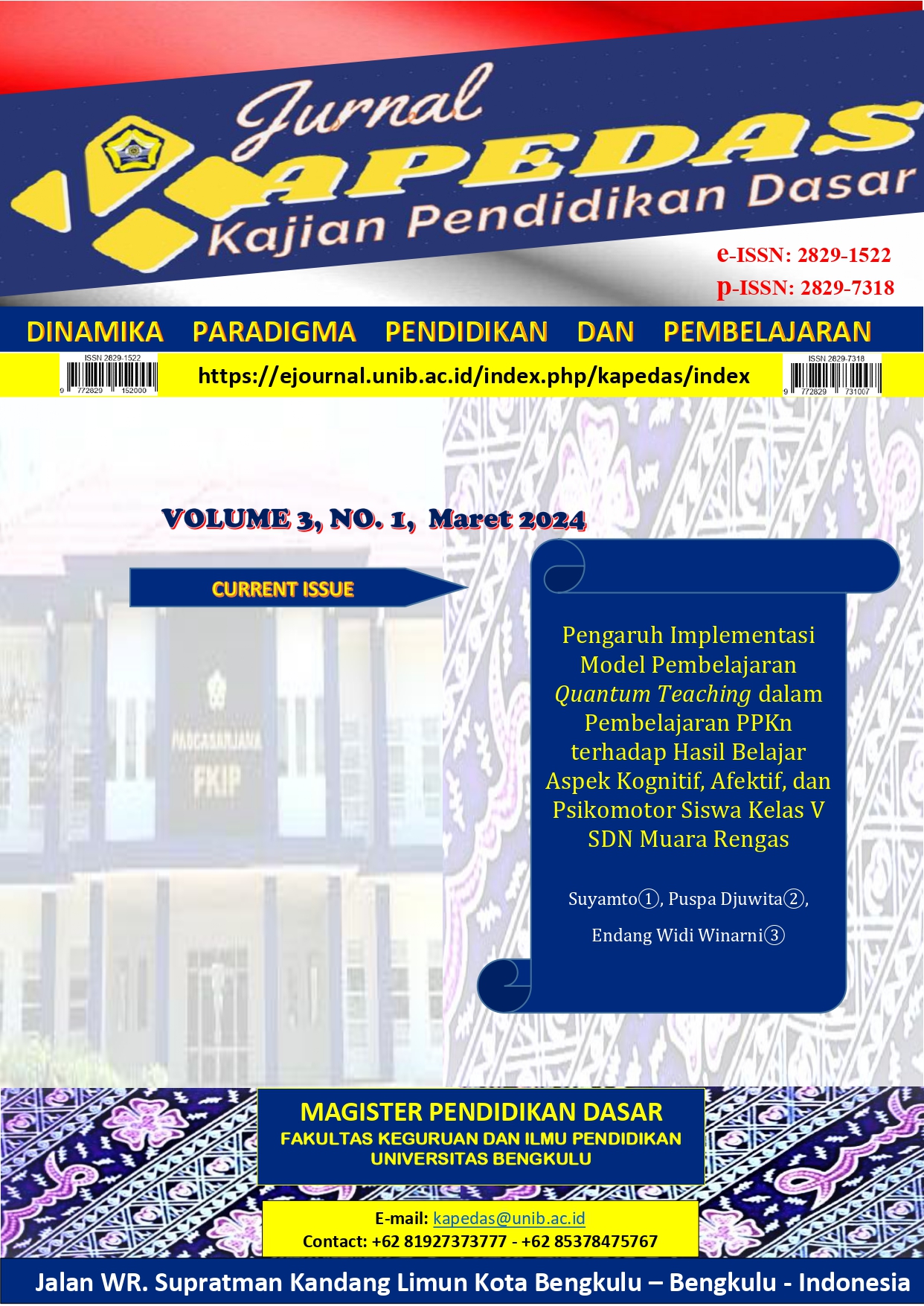Main Article Content
Abstract
This study aims to determine the effect of applying Student Worksheets based on Problem Based Learning on the critical thinking skills in aspects of giving simple explanations and organizing strategies and tactics in fifth grade elementary school students. This research is a quantitative research. The method used is a quasy experiment. The design in this study is The Matching Only Pretest-Posttest Control Group Design. The population in this study were all fifth grade students at SDN 1 Banpres and all fifth grade students at SDN 2 Banpres. The sample in this study were 22 students in class V SDN 1 Banpres as the experimental class and 24 students in class V SDN 2 Banpres as the control class. The instrument given was in the form of a written test consisting of variable aspects of critical thinking skills giving simple explanations as well as aspects of managing strategies and tactics. The results showed that there was a significant effect of the application of Problem Based Learning Student Worksheets on critical thinking skills in the aspect of giving simple explanations as well as aspects of managing the strategies and tactics of class V students at SDN 1 Banpres.
Article Details
Copyright (c) 2024 Ning Handayani, Endang Widi Winarni, Agus Susanta

This work is licensed under a Creative Commons Attribution-ShareAlike 4.0 International License.

Karya ini dilisensikan di bawah Creative Commons Attribution-ShareAlike 4.0 International License .
References
-
Abdurrahman, A., Setyaningsih, C. A., & Jalmo, T. (2019). Implementating multiple representation-based worksheet to develop critical thinking skills. Journal of Turkish Science Education, 16(1), 138–155. https://doi.org/10.12973/tused.10271a
Iqbal, M., Simarmata, J., Feriyansyah, F., Tambunan, A. R. S., Sihite, O., Gandamana, A., Eza, G. N., Kurniawan, F., Asiah, A., Rozi, F., Faisal, F., Manurung, I. F. U., Ihwani, M., Nathan, P. L. A., Sitanggang, N., Simbolon, N., Simanjuntak, E. B., & Limbong, T. (2018). Using Google form for student worksheet as learning media. International Journal of Engineering and Technology(UAE), 7(3.4 Special Issue 4), 321–324. https://doi.org/10.14419/ijet.v7i2.29.13646
Firdausi, B. W., Yermiandhoko, Y., & Surabaya, U. N. (2021). Peningkatan Kemampuan Berpikir Kritis Pada Siswa Sekolah Dasar. Jurnal Pendidikan Dasar, 11(2), 229–243.
Handayani, W., Agustina, T. W., & Firdaus, M. G. (2022). The Skill Profile of Pre-Service Science Teachers In Writing Strem-Based (Science-Technology-Religion-Engineering-Mathematics) Science Teaching Materials. Formatif: Jurnal Ilmiah Pendidikan MIPA, 12(2), 253–268. https://doi.org/10.30998/formatif.v12i2.12020
Kurniawan, T., & Maryani, E. (2016). Pengaruh Lingkungan Keluarga Dan Lingkungan Sekolah Terhadap Keterampilan Berpikir Tingkat Tinggi Peserta Didik Dalam Pembelajaran Ips. Jurnal Pendidikan Ilmu Sosial, 24(2), 209. https://doi.org/10.17509/jpis.v24i2.1457
Nata, A. S., & Manuaba, I. B. S. (2022). Lembar Kerja Peserta Didik Berbasis Problem-based Learning pada Topik Sumber Energi untuk Kelas IV Sekolah Dasar. Mimbar Ilmu, 27(1), 1–10. https://doi.org/10.23887/mi.v27i1.46232
Pecore, J. L. (2012). Beyond Beliefs: Teachers Adapting Problem-based Learning to Preexisting Systems of Practice. Interdisciplinary Journal of Problem-Based Learning, 7(2), 9–26. https://doi.org/10.7771/1541-5015.1359
Rano Ma, P. (2019). Our Experiences in Conducting PBL Session at Universal College of Medical Sciences (UCMS) Bhairahawa Nepal. American Journal of Biomedical Science & Research, 6(3), 182–187. https://doi.org/10.34297/ajbsr.2019.06.001024
Shoimin, (2104) 68 Model Pembelajaran Inovatif dalam Kurikulum 2013.(Ar-Ruzz Media: Yogyakarta
Winarni, E. W. (2018). Teori dan Praktik Penelitian Kuantitatif Kualitatif Penelitian Tindakan Kelas (PTK) Reseach And Development (R&D). Jakarta: Bumi Aksara
References
Iqbal, M., Simarmata, J., Feriyansyah, F., Tambunan, A. R. S., Sihite, O., Gandamana, A., Eza, G. N., Kurniawan, F., Asiah, A., Rozi, F., Faisal, F., Manurung, I. F. U., Ihwani, M., Nathan, P. L. A., Sitanggang, N., Simbolon, N., Simanjuntak, E. B., & Limbong, T. (2018). Using Google form for student worksheet as learning media. International Journal of Engineering and Technology(UAE), 7(3.4 Special Issue 4), 321–324. https://doi.org/10.14419/ijet.v7i2.29.13646
Firdausi, B. W., Yermiandhoko, Y., & Surabaya, U. N. (2021). Peningkatan Kemampuan Berpikir Kritis Pada Siswa Sekolah Dasar. Jurnal Pendidikan Dasar, 11(2), 229–243.
Handayani, W., Agustina, T. W., & Firdaus, M. G. (2022). The Skill Profile of Pre-Service Science Teachers In Writing Strem-Based (Science-Technology-Religion-Engineering-Mathematics) Science Teaching Materials. Formatif: Jurnal Ilmiah Pendidikan MIPA, 12(2), 253–268. https://doi.org/10.30998/formatif.v12i2.12020
Kurniawan, T., & Maryani, E. (2016). Pengaruh Lingkungan Keluarga Dan Lingkungan Sekolah Terhadap Keterampilan Berpikir Tingkat Tinggi Peserta Didik Dalam Pembelajaran Ips. Jurnal Pendidikan Ilmu Sosial, 24(2), 209. https://doi.org/10.17509/jpis.v24i2.1457
Nata, A. S., & Manuaba, I. B. S. (2022). Lembar Kerja Peserta Didik Berbasis Problem-based Learning pada Topik Sumber Energi untuk Kelas IV Sekolah Dasar. Mimbar Ilmu, 27(1), 1–10. https://doi.org/10.23887/mi.v27i1.46232
Pecore, J. L. (2012). Beyond Beliefs: Teachers Adapting Problem-based Learning to Preexisting Systems of Practice. Interdisciplinary Journal of Problem-Based Learning, 7(2), 9–26. https://doi.org/10.7771/1541-5015.1359
Rano Ma, P. (2019). Our Experiences in Conducting PBL Session at Universal College of Medical Sciences (UCMS) Bhairahawa Nepal. American Journal of Biomedical Science & Research, 6(3), 182–187. https://doi.org/10.34297/ajbsr.2019.06.001024
Shoimin, (2104) 68 Model Pembelajaran Inovatif dalam Kurikulum 2013.(Ar-Ruzz Media: Yogyakarta
Winarni, E. W. (2018). Teori dan Praktik Penelitian Kuantitatif Kualitatif Penelitian Tindakan Kelas (PTK) Reseach And Development (R&D). Jakarta: Bumi Aksara
